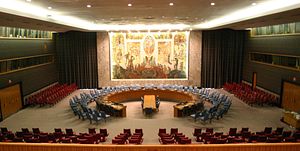The sanctions, called the “toughest and most comprehensive” ever by UN Secretary General Ban Ki-moon, dramatically limit North Korea’s coal exports, as well as banning outright its sale of certain metals, statues, and helicopters.
Under the U.S.-led resolution, which was voted for by all 15 nations represented on the council, Pyongyang will be limited to annual coal exports of 7.5 million tons, a more than 60 percent reduction from its sales in 2015.
The resolution also blacklists 10 individuals and 11 entities, freezing their assets and restricting travel.
Samantha Power, the U.S. ambassador to the UN, said the measures would deprive the regime of some $700 million in hard currency, blunting its ability to pursue nuclear weapons and missile development.
“So long as the DPRK makes the choice it has made, which is to pursue the path of violations instead of the path of dialogue, we will continue to work to increase the pressure and defend ourselves and allies from this threat,” Power told media in New York, using North Korea’s official name, the Democratic People’s Republic of Korea.
The latest sanctions come after almost three months of negotiations between Washington and Beijing, which has become increasingly unwilling to shelter its traditional ally out of frustration with its repeated weapons tests.
Coal exports, mostly to China, are one of isolated North Korea’s few big money makers. Pyongyang exported a record 2.46 million tons of coal to China in August, according to the Korea International Trade Association, softening the impact of numerous existing sanctions imposed over its nuclear and missile tests.
Adam Cathcart, an expert in Sino-North Korea relations at the University of Leeds, said the sanctions were notable for targeting North Korea’s self-promotion efforts overseas, in addition to its pocketbook.
“The prohibition of statue sales would put a dent in the overseas activities of the Mansudae Arts Studio, an important locus of activity for the regime not just in terms of its own self-glorification, but also the intersection of income generation and what most states would call a ‘soft power’ strategy,” Cathcart told The Diplomat.
Joshua Stanton, who helped draft separate U.S. sanctions against the regime, expressed disappointment with the resolution, challenging claims that it was especially tough.
Writing at his blog One Free Korea, he said the UN would struggle to monitor the amount of coal imported by China, and that the export restrictions, even if enforced, weren’t deep enough to cause the regime serious financial hardship.
“Overall, I’m not impressed,” Stanton told The Diplomat. “We’d have been better off joining forces with our allies to enforce the sanctions that the UNSC had already passed than settle for this.”

































